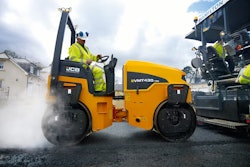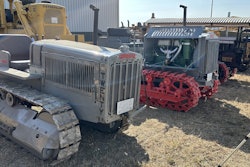The Illinois Department of Transportation is leaping federal non-road diesel emission regulations by at least three years with its enforcement of the Clean Air Construction Initiative on the agency’s Dan Ryan and Kingery Expressway projects.
The initiative is the result of recommendations from health and environmental focus groups and partnerships with the U.S. and Illinois environmental protection agencies, Chicago public schools, the American Lung Association and local community agencies. The plan is designed to be a blueprint for maintaining the health of area residents during road construction by reducing emissions from heavy equipment and trucks.
But implementation of the CACI could also mean increased costs for contractors and fewer bids for IDOT projects – which could lead to higher costs for taxpayers.
“It’s absolutely a concern to the contracting community,” said Bill Grams, executive director of the Illinois chapter of the American Road & Transporation Builders Association.
Grams said his organization, which represents Illinois road construction contractors, isn’t necessarily opposed to IDOT implementing emission restrictions. However, he said the benefits must be weighed against the price.
“Taxpayers end up eating that cost,” he said.
This is the first use of IDOT’s tighter construction equipment emission standards, which were officially introduced last year.
The four-year $430 million Dan Ryan Expressway (I-94/90) reconstruction project spans 31st Street to I-57/Halsted Street. As part of the reconstruction, IDOT will add expressway lanes, improve local access roads and reconfigure the skyway interchange to allow for safer driving conditions.
Most of the heavy construction equipment used Dan Ryan Expressway project will be retrofitted with devices designed to reduce diesel emissions or will use ultra low sulfur diesel fuel that is significantly cleaner regular diesel fuel. The agency will also enforce idling limits and dust controls on large trucks.
At least 290 pieces of construction equipment will be affected by the initiative, funded in part by a $60,000 grant from the U.S. EPA that will pay for some of the $2,000 to $3,000 emission reduction units.
Grams said the initiative in effect puts in place federal diesel emission standards that don’t become fully operative until 2010, and contractors might not be prepared financially.
A “hidden cost” could result from small contractors being pushed out of state contract bidding, which in turn could mean fewer bids for projects. Grams said this would raise the price of those state projects and make them more expensive for taxpayers.
Mike Claffey, a spokesman for IDOT, said this scenario is not realistic. He said by putting the emission reducing initiative in place now, the agency becomes proactive with environmental issues.
“We’re getting ahead of the game here,” Claffey said.
There is also debate on whether reducing construction equipment emissions will have any effect on the area’s total pollution. The Dan Ryan Expressway is one of the busiest in the nation, carrying more than 300,000 vehicles daily.
Claffey said all that traffic equals a lot of emissions for residents near the expressway, regardless of construction.
To understand the emissions impact of the road project prior to, during and after construction, IDOT has installed devices to monitor air quality along the Dan Ryan construction zone. Monitoring devices have already been installed at six public elementary schools and a park district and will be installed at a public housing facility in September.
IDOT plans to use reports from those devices as guides for future construction. The project is already serving as a model for other transportation agencies.
TheIllinois Tollway has adopted IDOT’s CACI and is mandating the use of either ultra-low-sulfur diesel or retrofitted construction equipment on reconstruction and widening projects along the south tri-state (I-80/294) and the Ronald Reagan Memorial Tollway (I-88), as well as on the construction of the I-355 south extension.
But organizations representing contractors said forcing contractors to accept the initiative could hurt the road construction industry.
“It’s an acknowledgment that work in urban areas requires different things,” Grams said.
Patrick Beeson can be contacted at [email protected].









